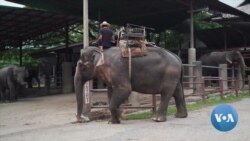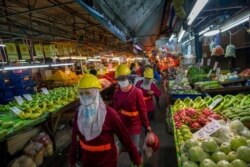Migrant workers stuck in Thailand since the COVID - 19 lockdown began in March are facing unclear immigration status and mounting bills even as the government provides some aid for unemployed laborers in the country.
Just days after the Emergency Decree on March 23, Thailand shut down all border checkpoints and announced social security benefits for all workers who were affected - both Thais and foreigners.
But the qualifications required to receive the aid - including a Thai bank account and at least six months of contributing to the government fund - have resulted in the exclusion of the most vulnerable, including millions of migrants from neighboring countries.
For unemployed foreign workers like single mother Ma Win, a government social security payment was a welcome benefit earlier this month. But she says it was long overdue and about 20% less than what her Thai co-workers received.
Win, an ethnic Karenni from Myanmar, received a single payment of just half a months' wage after working 14 years in a restaurant at a popular elephant camp on the outskirts of Chiang Mai, in Northern Thailand.
The owner of the camp provides housing for many of the employees, but the workers pay for food and utility bills.
Ma Win’s monthly salary at the tourist center was $235. The government payment to her was about $125.
During the high season, the camp employs about 300 workers to help care for more than 70 elephants on the compound.
Rising debt, no work
Despite the payment that Win received - after airing her grievances to a government official who visited the tourist site last month - she now faces mounting debt and expired work papers.
“Right after I borrowed the money to extend my visa, then my job was shut down and now I cannot pay back the money to my boss because I don’t have a job to go to right now,” the 45 year-old cook explains, as she prepares a meal of rice and noodles for her extended family who share the three-room bamboo hut.
“I didn’t expect this sort of disease and before the pandemic we were daily workers and would use the money to feed our family without saving much.”
Myanmar exiles and NGOs deliver donations collected at local temples that are frequented by Myanmar expatriots living in the Northern Thai capital.
Aid workers say more information and less complications by both the Thai and Myanmar governments would be a good step forward.
“As a migrant worker they cannot read Thai, they cannot speak properly so in that case the labor attache and the embassy should provide the translator to go to the different camps, to provide translators and translation so that the worker will understand better about the government assistance to get their social benefits,” explained Johny Adhirika, a worker with Metta Charity, a Thailand-base aid group.
Adhirika’s group have been delivering rice, noodles, water and other basic necessities to workers stranded in settlements surrounding Chiang Mai.
“Many of the migrants that we speak to say that when they ask questions about the social security benefits, officials often become impatient and ignore them,” Adhirika says.
With more than 80 elephant camps in the province, many of the workers hail from neighboring Myanmar, a country with more than 135 different ethnic minorities - and a wide variety of dialects.
Labor shortage looms
Many migrant workers have filed claims with labor advocate organizations, citing substandard treatment and unfair pay, based on their nationality.
And now, as work permits and temporary employment contracts expire for many migrants, businesses worry a labor shortage is looming - an outcome that analysts say, can be avoided.
“Thailand should allow migrants to renew their work permits and documents without returning to Myanmar to do a new MOU (memorandum of understanding). Otherwise they will have to spend a lot of money while unable to earn an income during the crisis,” explained Sukarn Ta Sukphat from the Human Rights Development Foundation.
“When the Covid first hit, the government was only concerned about tourism and the Thai people, but no-one brought up the migrant issue and they treat the migrants with double standards,” the former Thai labor union worker added.
But that stance has shifted somewhat as Thailand’s economic recovery plan will need to include the migrant work force, which makes up about 4 million workers in the country.
Stay or go ?
Thailand’s Employment director, Suchart Phonchaiwisetkun,has met with officials from Myanmar and Cambodia earlier this month, recommending that migrant workers remain in Thailand to save transportation costs and prevent the risk of spreading COVID - 19, according to Thai Press.
“Myanmar officials agreed to the preliminary principles and want relevant agencies in Thailand and Myanmar to meet in a video conference later,” said Suchart on June 9, during a meeting with Myanmar Ambassador Myo Myint Than.
According to the Thai Nation newspaper, some 1,500 migrant workers per day were reportedly returning to Myanmar in recent weeks.
As travel restrictions ease in the region, labor advocates are hoping that the government will also loosen up regulations for migrant workers and their families living in Thailand.






